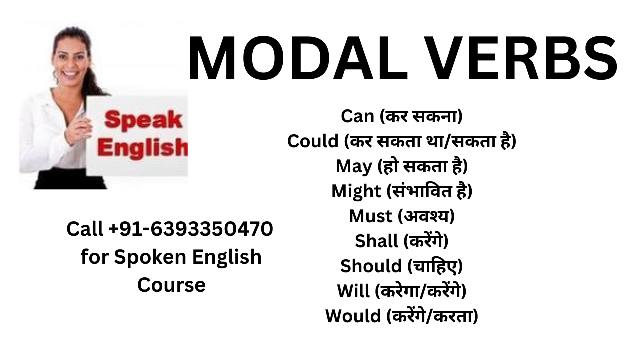Modal Verbs in English

Modal Verbs: Definition & Usage Examples
Modal verbs, also known as modal auxiliary verbs or simply modals, are a specific category of auxiliary verbs in the English language. They play a crucial role in expressing the mood, attitude, or likelihood of an action or event. Modal verbs are different from regular verbs in several ways:
List of Modal Verbs:
Can
Could
May
Might
Must
Shall
Should
Will
Would
Characteristics:
They do not change their form; they remain the same for all subjects (no -s, -ing, or -ed forms).
They are always followed by the base form of the main verb (except "ought to" which is followed by "to" and the base form).
Functions:
Modal verbs are used to express various meanings and functions, including:
Ability: "Can" and "could" are used to indicate one's ability to do something.
Example: "I can swim."
Possibility: "May," "might," and "could" express the idea of something being possible or likely.
Example: "It may rain tomorrow."
Permission: "Can," "could," and "may" are used to ask for or grant permission.
Example (asking for permission): "Can I go to the party?"
Example (granting permission): "You may leave early."
Obligation and Necessity: "Must" and "have to" indicate that something is necessary or required.
Example: "You must finish your homework."
Expectation and Probability: "Should" and "ought to" express an expectation or suggest what is the right thing to do.
Example: "You should be on time for the meeting."
Willingness and Offers: "Will" and "would" can be used to express willingness or make offers.
Example (willingness): "I will help you with your project."
Example (offer): "Would you like some coffee?"
Requests and Politeness: "Could" is often used to make requests and is considered more polite than "can."
Example: "Could you pass me the salt?"
Negation and Question Formation:
To make a negative sentence, you usually add "not" after the modal verb (e.g., "can" becomes "cannot" or "can't").
To form questions, you invert the subject and the modal verb (e.g., "Can you swim?" becomes "Can you swim?").
Modal verbs are a fundamental part of English grammar, and understanding how to use them correctly is essential for effective communication in both spoken and written English. They add nuance to the language, allowing speakers to convey their intentions, expectations, and attitudes towards various situations.
Modals for Politeness:
Modals like "could," "would," and "might" are often used to soften requests and make them more polite. For example, "Could you please pass me the salt?" is more polite than "Pass me the salt."
Modals in Conditional Sentences:
Modal verbs are frequently used in conditional sentences to express different levels of certainty and possibility. For example:
First Conditional (Real possibility): "If it rains, we will stay indoors."
Second Conditional (Unreal or hypothetical): "If I won the lottery, I would travel the world."
Modals for Deduction:
Modal verbs like "must," "may," "might," and "could" can be used to make deductions or guesses about a situation. For example:
"She must be at home if she's not answering her phone." (strong guess)
"It may rain later." (possibility)
Modals for Advice:
"Should" and "ought to" are used to offer advice or make recommendations:
"You should eat more vegetables for better health."
Modals in Reporting Speech:
Modal verbs are often used in reported speech to convey the attitude or opinion of the speaker. For example:
Direct speech: "I can help you."
Reported speech: She said that she could help me.
Modals and Tense:
Modal verbs do not have a tense of their own. They remain the same regardless of the time frame. The tense is usually conveyed through the main verb. For example:
Present: "I can play the guitar."
Past: "She could swim when she was five."
Double Modals:
In some cases, you may encounter sentences with double modals, where two modal verbs appear together, such as "can/could," "might/must," etc. These are used for added nuance. For example:
"I might could help you with that" (common in some dialects for offering assistance).
Modal Perfects:
Combining modal verbs with perfect tense forms (e.g., "may have," "must have") allows you to express past possibilities, expectations, or obligations. For example:
"She must have forgotten about the meeting."
Modals and Culture:
The use of modals can vary between cultures and regions. What may be considered polite in one culture might be too direct in another. It's essential to be aware of these cultural nuances when using modals.
Understanding how to use modal verbs effectively can greatly enhance your communication skills in English, allowing you to express your intentions, attitudes, and opinions more precisely. Keep in mind that context plays a significant role in determining which modal is appropriate for a given situation.
Modal Verbs and Certainty:
Modal verbs can indicate different degrees of certainty or probability. Here's a rough scale from high certainty to low certainty:
Must: High certainty - "It must be true."
Should: Strong recommendation or expectation - "He should arrive soon."
May/Might: Possibility or uncertainty - "She may come to the party."
Can/Could: General ability or possibility - "I can speak Spanish."
Modal Verbs in the Passive Voice:
Modals can also be used in passive voice constructions. For example: "The problem can be solved."
Modal Verbs with Infinitives and Bare Infinitives:
Sometimes, modals are followed by an infinitive form of the main verb (e.g., "She can swim") or a bare infinitive (the base form of the verb without "to," e.g., "He can go"). The choice depends on the specific modal used.
Modals of Necessity vs. Modals of Volition:
Modals of necessity (must, have to) express obligations and requirements, while modals of volition (can, could, may, might) express the ability or willingness to do something. For example:
Necessity: "I must finish my homework."
Volition: "I can help you with your homework."
Modal Verbs for Hedging:
Modal verbs can be used for hedging or softening statements to make them less assertive. For example: "She might be right, but I'm not sure."
Double Negatives:
Be cautious with double negatives when using modals. In standard English, double negatives cancel each other out, making the statement positive. For instance, "I can't not go" means "I have to go."
Formality and Context:
The choice of modal verb can convey formality or informality. For example, "Could you please pass the salt?" is more formal than "Can you pass the salt?" Context matters in determining which is appropriate.
Idiomatic Expressions with Modals:
English has several idiomatic expressions that involve modal verbs. For instance, "You might as well" is an idiomatic way of saying "you should."
Modals for Past Deduction:
Modals like "must have," "may have," and "might have" are used to make deductions about past events. For example: "He must have missed the bus."
Mastering modal verbs is an essential aspect of becoming proficient in English, as they allow you to convey your intentions, attitudes, and shades of meaning in a variety of situations. Understanding when and how to use modal verbs effectively can greatly improve your ability to express yourself clearly and appropriately in both spoken and written English.
Exercise 1: Choose the correct modal verb to complete the sentences.
She ____ be here by now. (must/may)
You ____ finish your assignment on time. (should/can)
He ____ have forgotten about the meeting. (may/must)
____ I borrow your pen for a moment? (Will/Can)
If he studies hard, he ____ pass the exam. (might/will)
I ____ have left my phone at home. (can/must)
You ____ to wear a tie for the interview. (have to/should)
____ I help you with your bags? (Should/Must)
Explanations:
She must be here by now. (Expressing strong probability)
You should finish your assignment on time. (Giving advice)
He may have forgotten about the meeting. (Expressing possibility)
Can I borrow your pen for a moment? (Asking for permission)
If he studies hard, he will pass the exam. (Expressing future certainty)
I must have left my phone at home. (Expressing strong deduction)
You have to wear a tie for the interview. (Indicating obligation)
Can I help you with your bags? (Offering assistance)
Exercise 2: Fill in the blanks with the correct modal verb.
You ____________ bring an umbrella. It might rain.
My grandmother ____________ bake delicious cookies.
The concert is about to start. We ____________ hurry!
I'm not sure if he ____________ come to the party.
We ____________ go to the store after work. It's necessary.
She ____________ swim when she was five.
It's a secret. You ____________ tell anyone.
____________ I leave early today?
Explanations:
You should bring an umbrella. It might rain. (Expressing a suggestion)
My grandmother can bake delicious cookies. (Expressing ability)
The concert is about to start. We must hurry! (Expressing necessity)
I'm not sure if he will come to the party. (Expressing uncertainty)
We have to go to the store after work. It's necessary. (Indicating obligation)
She could swim when she was five. (Describing past ability)
It's a secret. You mustn't tell anyone. (Indicating prohibition)
Can I leave early today? (Asking for permission)
These exercises help practice the use of modal verbs in different contexts. Modal verbs are versatile and are used to convey a range of meanings, from possibility and ability to necessity and politeness. Understanding when to use each modal verb is essential for effective communication in English.
We hope that you must have found this exercise quite useful. If you wish to join online courses on Networking Concepts, Machine Learning, Angular JS, Node JS, Flutter, Cyber Security, Core Java and Advance Java, Power BI, Tableau, AI, IOT, Android, Core PHP, Laravel Framework, Core Java, Advance Java, Spring Boot Framework, Struts Framework training, feel free to contact us at +91-9936804420 or email us at aditya.inspiron@gmail.com.
Happy Learning
Team Inspiron Technologies

Leave a comment